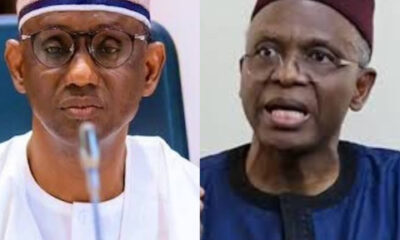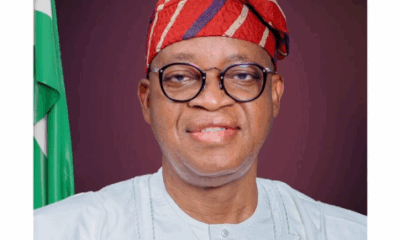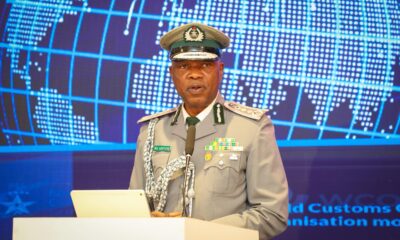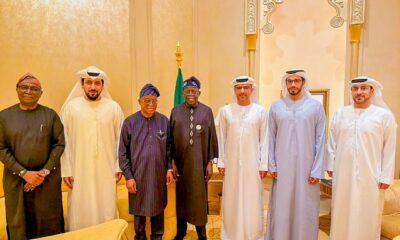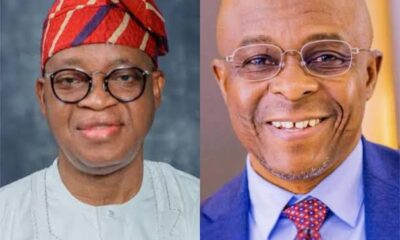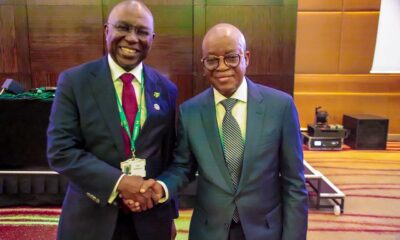Maritime
Akutah Says Nigerian Ports Have Achieved 90% Automation
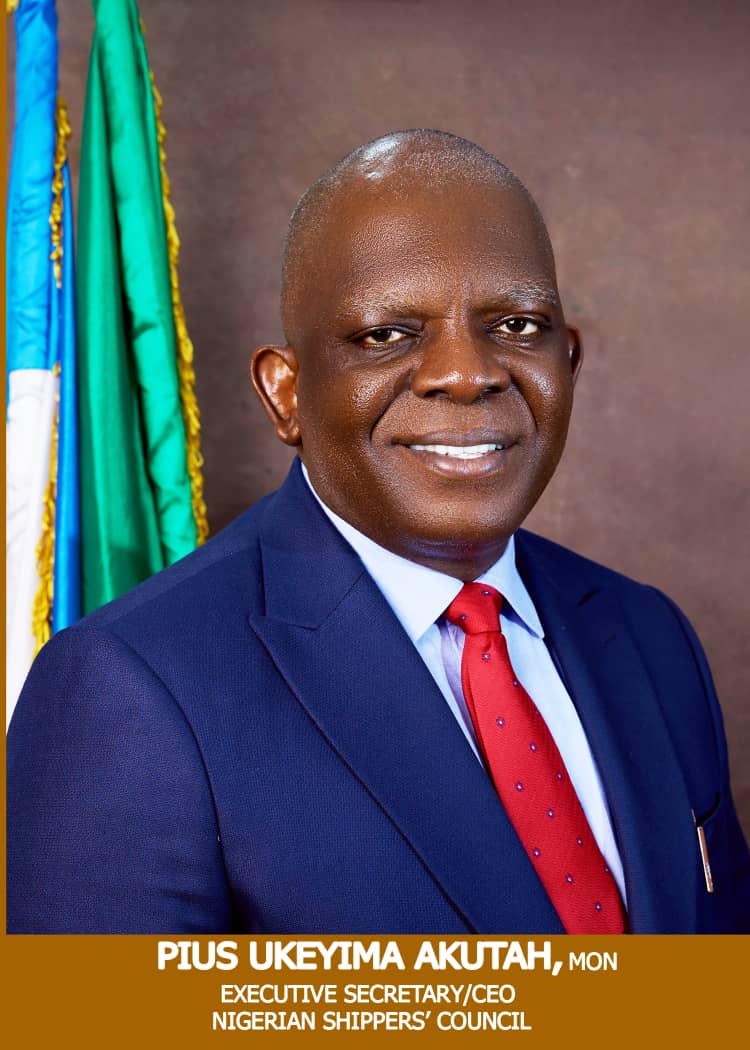
BY GBOGBOWA GBOWA
The Nigerian Shippers’ Council (NSC) Wednesday said over 90 percent of port processes and operations have been automated, a situation the council declared has considerably reduced human interactions including all its negative tendencies at the nation’s ports.
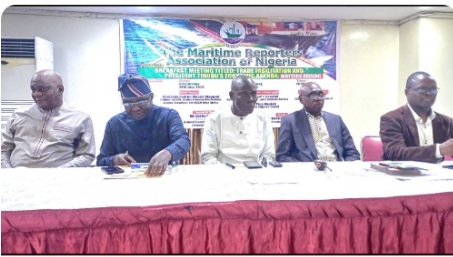
L-R Lucky Amiwero, Muda Yusuf, Godfrey Bivbere, Moses Fadipe and Igwe Alban during the breakfast meeting
The Council Executive Secretary/CEO, Barr. Pius Ukeyima Akutah who made the disclosure in his goodwill message at the Breakfast Meeting organised by the Maritime Reporters’ Association of Nigeria (MARAN) in Lagos with the theme, “Trade Facilitation and President Tinubu’s Economic Agenda: Matters Arising”, assured that NSC would continue to advocate and promote the digitalization of port operations and processes in line with global best practice, more so in consonance with the Renewed Hope Agenda of the administration of President Bola Ahmed Tinubu.
This is even as stakeholders affirmed the nation’s stride in improved vessel boarding and rummaging procedures, in addition to calls for the introduction of a marine and blue economy blueprint by the federal government.
Speaking, Akutah who was represented at the event by the Council’s Assistant Director, Consumer Affairs, Ogbonnaya Austina while enumerating efforts of the Council to facilitate trade, said Inland Dry Ports (IDPs) in Funtua, Kaduna and Kano are presently operational as port of origin and final destination for inward and outward cargo movement, respectively.
Akutah said, “The shipping community in these inland locations are already taking the benefits of these facilities in the conduct of their businesses. The President’s directives that immediate steps be taken to complete and commission the remaining legacy IDP projects are being pursued with vigor.
“Similarly, efforts are being geared to the development of Vehicle Transit Areas, VTAs across the country to facilitate the safety and security of cargo in transit.”
The NSC boss assured that the Council is intensifying efforts to ameliorate the challenges faced by cross border traders at land border posts via the establishment of Border Information Centres (BICs) which according to him, was being done in collaboration with the United States Agency for International Development (USAID) and Borderless Alliance (BA).
“Four (4) BICs have been established at Seme-Krake border between Nigeria and Benin Republic; Jibia-Marradi border between Nigeria and Niger; Mfum-Ekot border between Nigeria and Cameroon and Illela-Bimin Koni border between Nigeria and Niger.
“Two (2) more BICs shall be established under the Council’s current strategic plan. Plans have reached advanced stages with regard to the establishment of a BIC at the Idiroko Border Post. BICs are veritable facilities for gathering data on cross border trade for policy making as well as providing trade facilitating information to cross border stakeholders.
Espousing President Tinubu’s blueprint for the sector, Akutah said, “There is no doubt that this topic was carefully chosen to align with the Federal Government Renewed Hope Agenda to facilitate trade and bring prosperity to Nigerians. The administration of President Bola Ahmed Tinubu, GCFR laid down 8-Point Agenda to revamp Nigeria economy which is tagged ‘Renewed Hope’.
“The President’s 8-Point Agenda are: Reform the economy to deliver sustained inclusive growth; Strengthen national security for peace and prosperity; Boost agriculture to achieve food security; Unlock energy and natural resources for sustainable development; Enhance infrastructure and transportation as enablers of growth; Focus on education, health and social investment as essential pillars of development; Improve governance, and fight corruption to ensure that economic growth is not endangered by corrupt practices.
“There is no doubt from the inception of the administration that the President meant business in the various sectors of the economy. Looking at the Maritime and Transport sectors, the President unbundled the Federal Ministry of Transportation into two ministries namely: the Ministry of Transportation and the Ministry of Marine and Blue Economy.
“This is for effective service delivery and expansion of the revenue base of the economy.”

He assured that the Council would continue to promote and support establishment of port and transport infrastructure in order to facilitate both domestic and international trade.”
Renown industry analyst and productivity minder, Dr. Muda Yusuf in his keynote address called attention to the absence of the statistics of maritime sector contribution to nation’s GDP, which he said achieved 16percent in 2023. The CEO of the Center for Promotion of Public Enterprises (CPPE) the percentage which amounted to over N27 trillion was driven largely by domestic trade.
He challenged the maritime media to inquire into this obvious data gap, noting that the lack of such critical information is a major disservice to economic planning and appraisal.
“The maritime sector, or the blue economy, represents far more than water transportation. In 2023, water transport contributed a mere N12.6 billion to the GDP, a figure that grossly under-represents the sector’s true value. The maritime sector handles over 95% of our international merchandise trade, with the total trade value reaching N71.9 trillion in 2023.”
He notes that the state of trade facilitation within the context of the administration’s eight-point agenda covers food security, poverty eradication, economic growth, job creation, access to capital, inclusion, rule of law, and anti-corruption measures.
“Trade facilitation is integral to achieving the administration’s goals,. Every pillar of the agenda has an import or export component, making seamless international trade processes vital for the desired outcomes.
“President Tinubu in his inaugural address emphasized the need for an improved internal trade process, highlighting trade facilitation as a driver of the renewed hope agenda.”
Yusuf further noted that the concept of trade facilitation is on the whole impacted by trade costs which include shipping, demurrage, storage fees, insurance, haulage, container costs, import duty, regulatory fees, levies, taxes, and corruption.
“The discussion on trade facilitation should focus on reducing these costs to enhance our economy’s competitiveness”, even as he outlined some essential reforms and critical economic pillars necessary to drive trade facilitation.
He said whereas the Nigeria Customs Service (NCS) is statutorily saddled with about 70percent task in trade facilitation and acknowledged the significant strides being made by the NCS, he applauded the recent launch of the Time Release Study (TRS) aimed at tracking the efficiency or delays and bottlenecks associated with cargo clearance process.
Yusuf also praised the Authorized Economic Operators (AEO) program recently integrated into the clearance procedure to incentivize and reward compliance in cargo declaration processes.
“We must focus on the critical pillars of trade facilitation and implement necessary reforms to drive economic transformation. The maritime sector’s potential is vast, and with the right policies and practices, we can unlock significant benefits for our economy,” he said.
Making his intervention, the founder, Skynet Trueway International Limited, Mr. Moses Olayemi Fadipe notes that to make meaningful headway in the nation’s newly established marine and blue economy, the federal government in collaboration with industry players must come up with a blue print.
According to the former Nigerian Shippers’ Council star boy who chaired the occasion, the use of discretionary powers by government agencies at the port is unnecessary and creating unintended, negative consequences.
He argued that the goals of the blue economy can only be achieved through deliberate policy thrusts that at the same time encourages competitiveness between Nigerian port and her sub regional counterparts.
“The basic thing is how do we foster efficiency of our maritime sector through compliance, and how best can we develop indigenous shipping, to be able to foster competitiveness. How efficient and predictable are our port system? Do we have a maritime blueprint with clear structured timelines to be followed religiously? Do we have the official courage to identify wrong doing and punish those concerned? Government must have the determination to build and grow its economy, and must have the political will to act accordingly.”

